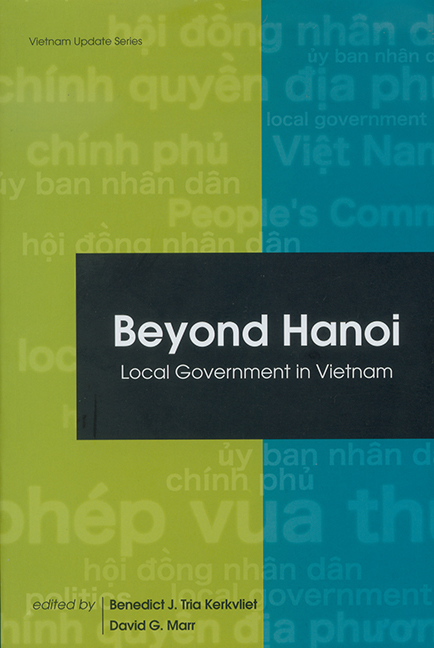Book contents
- Frontmatter
- Contents
- Preface
- Abbreviations
- 1 Surveying Local Government and Authority in Contemporary Vietnam
- 2 A Brief History of Local Government in Vietnam
- 3 Village Government in Pre-colonial and Colonial Vietnam
- 4 Caught in the Middle: Local Cadres in Hai Duong Province
- 5 Winter Crop and Spring Festival: The Contestations of Local Government in a Red River Delta Commune
- 6 Local Politics and Democracy in a Muong Ethnic Community
- 7 Local Government in the Exercise of State Power: the Politics of Land Allocation in Black Thai Villages
- 8 Urban Government: Ward-level Administration in Hanoi
- 9 The Facilitators of Rural Transformation and Development: The Role of Agricultural Extension Officers in Two Districts of Long An Province
- 10 Ho Chi Minh City's Post-1975 Political Elite: Continuity and Change in Background and Belief
- 11 Push, Pull, and Reinforcing: The Channels of FDI Influence on Provincial Governance in Vietnam
- Glossary of Vietnamese Terms
- Index
- About the Contributors
10 - Ho Chi Minh City's Post-1975 Political Elite: Continuity and Change in Background and Belief
Published online by Cambridge University Press: 21 October 2015
- Frontmatter
- Contents
- Preface
- Abbreviations
- 1 Surveying Local Government and Authority in Contemporary Vietnam
- 2 A Brief History of Local Government in Vietnam
- 3 Village Government in Pre-colonial and Colonial Vietnam
- 4 Caught in the Middle: Local Cadres in Hai Duong Province
- 5 Winter Crop and Spring Festival: The Contestations of Local Government in a Red River Delta Commune
- 6 Local Politics and Democracy in a Muong Ethnic Community
- 7 Local Government in the Exercise of State Power: the Politics of Land Allocation in Black Thai Villages
- 8 Urban Government: Ward-level Administration in Hanoi
- 9 The Facilitators of Rural Transformation and Development: The Role of Agricultural Extension Officers in Two Districts of Long An Province
- 10 Ho Chi Minh City's Post-1975 Political Elite: Continuity and Change in Background and Belief
- 11 Push, Pull, and Reinforcing: The Channels of FDI Influence on Provincial Governance in Vietnam
- Glossary of Vietnamese Terms
- Index
- About the Contributors
Summary
In the field of Vietnam studies, Ho Chi Minh City's association with reform is one of the more entrenched beliefs. Government officials, diplomats, business people, journalists and academics have all at one time or another laid the reformist label at the city's door. Ho Chi Minh City is associated with reform, and its leaders are referred to as “reformers” and “technocrats”. However, there are many problems with the use of such terms. The first is that they are rarely defined, leaving one to gauge their implicit meaning. “Reformer” is usually taken to imply “greater support for the market” or perhaps support for “the rule of law”. Reformers are also not generally regarded as corrupt. Amid this vagueness and questionable logic, one suspects there is a tendency — possibly unconscious — to equate reformer with neo-liberal. The term “technocrat” is also rarely defined although it traditionally implies some kind of specialist, with higher education credentials. Less explicitly, it also assumes the elevation of technical criteria over political ones in decision-making. Both are major claims.
A second criticism of the use of the terms “reformer” and “technocrat” is simply that they represent a far too wooden and one-dimensional depiction of Ho Chi Minh City's leadership over a period of more than twenty-five years. Over such a timeframe, we are clearly dealing with a large number of leaders, particularly if we include departmental (so) and district (quan) politicians. At the very least, the definition of what constitutes a reformer is likely to change over time. Thus, what Nguyen Van Linh or Mai Chi Tho considered reform is likely to be quite different from that of the current generation.
While a full examination of the validity or otherwise of the terms “reformer” and “technocrat” is beyond the scope of this chapter, a critical approach to such terminology is prudent. What, for instance, is there about the background of Ho Chi Minh City's post-1975 leadership, which would lead us to expect them to forge a novel and independent path compared with those in charge of the rest of the country?
- Type
- Chapter
- Information
- Beyond HanoiLocal Government in Vietnam, pp. 259 - 284Publisher: ISEAS–Yusof Ishak InstitutePrint publication year: 2004



